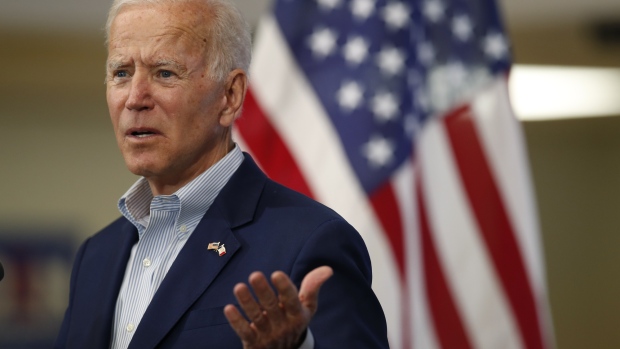Jun 12, 2019
Biden Faults Debate Format for Giving Candidates Too Little Time
, Bloomberg News

(Bloomberg) -- Vice President Joe Biden expressed concern about the format of the first Democratic presidential debates, saying that having 20 candidates face off over two nights means there will be little depth to the events.
“It’s a little bit of an exaggeration to call it a debate because there’s not really much time,” the Democratic front-runner said Wednesday at a campaign stop at a diner in Eldridge, Iowa.
The Democratic National Committee will select 20 of the unprecedented 23 candidates for the party nomination to take part in the forums July 26-27 in Miami. They will be be split into two groups, with 10 contenders chosen at random appearing each night.
Each event will include a mix of top-tier candidates, defined as those polling above 2%, and lower-polling ones, the DNC said. The split is designed to ensure that there isn’t an all-star debate on one night and a less desirable event featuring only lower-polling candidates on the second.
The rules stipulate that qualified candidates must either reach 1% in three approved polls or garner 65,000 unique donors from 20 states. Candidates have until Wednesday night to qualify to participate. If the number of eligible contenders ends up exceeding the current 20, the DNC will have to determine who gets cut. It will make that decision, and set the lineup for each night, by the end of the week.
Guaranteed a Spot
As of Wednesday morning, 14 had met both the polling and the funding criteria and were guaranteed a spot. They include the race’s top-tier contenders -- Biden, Senator Elizabeth Warren, Senator Bernie Sanders, Mayor Pete Buttigieg and Senator Kamala Harris. Also included were Senators Cory Booker, Kirsten Gillibrand and Amy Klobuchar, former HUD Secretary Julian Castro, Hawaii Representative Tulsi Gabbard, Washington Governor Jay Inslee, former Texas Representative Beto O’Rourke, spiritual healer Marianne Williamson and entrepreneur Andrew Yang.
Another six candidates -- Senator Michael Bennet of Colorado, New York Mayor Bill de Blasio, former Maryland Representative John Delaney, Colorado Governor John Hickenlooper, and Representatives Tim Ryan of Ohio and Eric Swalwell of California -- have met just the polling benchmark. But that doesn’t mean they will make it to Miami: They could be cut if other candidates qualify before the Wednesday night deadline.
Biden said the format and number of candidates would give the participants too little time to make substantive cases.
“In the presidential debates that I’ve been involved in before and as vice president, they’re basically 40-minute deals where you’d stand up there and go into detail about your programs and what you believe,” he said.
Tie-Breakers
The former vice president also expressed confusion about how the events will be structured, and added, “I don’t even think the DNC has quite figured out exactly how” the debates will work.
A DNC spokeswoman said that if too many qualify, the committee will decide who gets to debate by calculating the average of each candidate’s top three polling scores. If there is still a tie, candidates will be ranked based on the total number of polls where they reached 1% or more.
A failure to make the cut for the debates and the opportunity to mix it up with the front-runners would be a further blow to a campaign that is already struggling in the polls and in fundraising, though it wouldn’t necessarily be fatal.
“The measure of success is more than appearing on the debate stage: how much money you raised this quarter, what kind of staffing operation you’re putting in Iowa and New Hampshire, what your policy ideas are,” said Tad Devine, a veteran of Democratic presidential campaigns and a top strategist for Sanders in 2016. “It’s going to be more important to be in the top three in Iowa than it is to be in the top 20 on the debate stage.’’
Less-Known Contenders
The less-known candidates argue the debate rules are preventing them from having a voice. Montana Governor Steve Bullock, who so far hasn’t qualified, is upset about a DNC rule announced last week that bars open-ended polls from consideration. The move disqualifies a February Washington Post/ABC poll where Bullock garnered 1%, disqualifying what he considered his third eligible survey. The DNC said it had been transparent and notified the Bullock campaign several times since March that the open-ended poll would not qualify.
Along with Bullock, Mayor Wayne Messam of Miramar, Florida, and Massachusetts Representative Seth Moulton are not expected to qualify for the first debate.
As an attempt to further reduce the number of eligible candidates in the future, the DNC two weeks ago released more stringent rules to qualify for the third debate, which will be held in September. Candidates must have a minimum of 130,000 unique donors -- 400 from 20 unique states -- and garner 2% support in four qualifying polls released between June 28 and Aug. 28.
To contact the reporters on this story: Emma Kinery in Washington at ekinery@bloomberg.net;Jennifer Epstein in Washington at jepstein32@bloomberg.net
To contact the editors responsible for this story: Joe Sobczyk at jsobczyk@bloomberg.net, Max Berley, Laurie Asséo
©2019 Bloomberg L.P.







